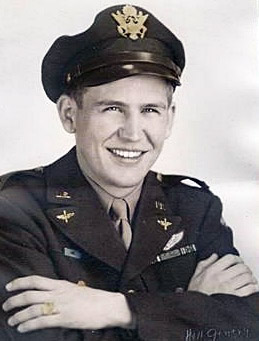Sergeant George Frailey Combs
Navigating Bombers Over Europe
by Richard D. L. Fulton
George F. Combs was born January 11, 1922, to parents Cooley and Clara Rowe Combs. He grew up in Emmitsburg and had two brothers, Samuel and Thomas.
Combs’ military registration card, filled in when he was 20, described him as being 5’7” and as having blue eyes and blonde hair, with a “ruddy” complexion.
Combs was married for 60 years to Doris Peppler Combs, 50 years of which was spent living in Alexandria, Virginia, according to Combs’ obituary, published at the time of Combs’ death in 2014 by The Frederick News-Post, among others.
He attended Mount Saint Mary’s University and graduated with honors in 1942. Also in 1942, he enlisted in the United States Army Air Corps. The United States Air Force did not yet exist in 1942 and would not be created until 1947.
Combs’ obituary stated that, following his graduation from navigation school, he was assigned to the 8th Air Force based in England. The 8th Air Force was initially designated as being the VIII BC (Bomber Command) in 1942, and was subsequently designated as the 8th Air Force during the reorganization of 1944, according to the Official United States Air Force Website (8af.af.mil).
Combs and the then-designated VIII BC were initially assigned to Daws Hill in England, and subsequently, headquartered in High Wycombe in Wycombe Abbey (a school for girls).
While stationed in England, Combs “became a lead navigator, guiding formations of B-17 bombers on missions over occupied Europe,” according to his obituary.
For his service with the 8th Air Force, Combs was awarded the Distinguished Flying Cross, three Air Medals, and four Battle Stars.
According to the Air Force website (8af.af.mil), from May 1942 to July 1945, “the Eighth planned and precisely executed America’s daylight strategic bombing campaign against Nazi-occupied Europe, and in doing so, the organization compiled an impressive war record.”
However, the website further noted that the successes of the 8th Air Force, which had included engaging in over 440,000 bomber sorties, during which, the planes dropped 697,000 tons of bombs, did not come without a price:
“The Eighth suffered about half of the U.S. Army Air Force’s casualties (47,483 out of 115,332), including more than 26,000 dead. The Eighth’s brave men earned 17 Medals of Honor, 220 Distinguished Service Crosses, and 442,000 Air Medals. The Eighth’s combat record also shows 566 aces (261 fighter pilots, with 31 having 15 or more victories, and 305 enlisted gunners).”
Combs attended Dickinson Law School, after having been discharged from the service, and graduated in 1948 with a law degree, subsequently becoming a member of the Maryland Bar Association.
He also spent his entire career with the United States Government Federal Trade Commission, according to his obituary, “he worked as a staff attorney and as a confidential advisor to several commissioners.” It was noted that Combs had also prepared the drafts of over a hundred Commission adjudicative opinions. According to The Washington Post, Combs also received the Federal Trade Commission’s Distinguished Service Award for his career contributions.
His obituary also noted that his most significant achievement “was his work on the opinion which resulted in the licensing of the patent on the antibiotic Tetracycline, saving consumers millions of dollars.”

Sergeant George Frailey Combs (Obituary photograph)
Anyone who might know a Veteran or is a Veteran, who would like to share their experiences in the military for publication in The Catoctin Banner, is invited to contact the columnist at richardfulton@earthlink.net. Thank you.
Upon Combs’ death from congestive heart failure (according to The Washington Post) at age 92, his memorial service was held at the Myers-Durboraw Funeral Home in Emmitsburg. He was interred in the Emmitsburg Memorial Cemetery.

